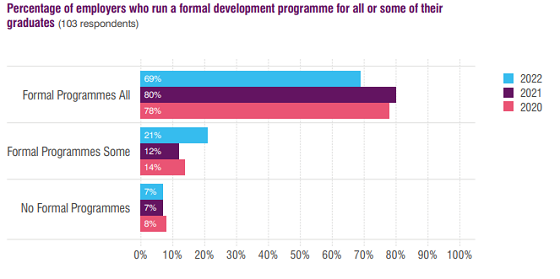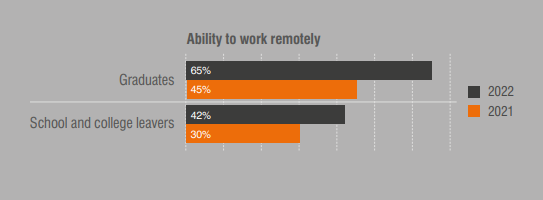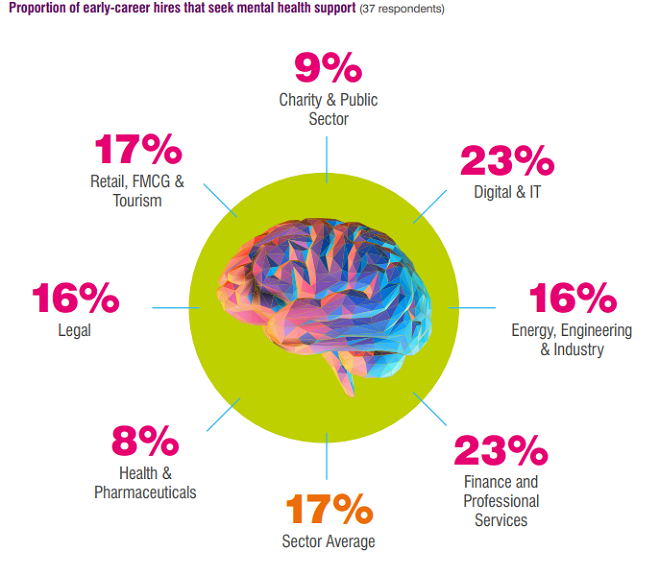The new world of work has changed how employers develop graduates in 2022, says Nicola Thomas, ISE’s head of research.
Remote work is here to stay and it can offer employees a range of benefits, such as the flexibility to fit jobs around personal lives and reduce long commutes. For organisations, remote or hybrid work opens up access to a whole new pool of talent.
However, it also comes with its own set of student development challenges. Digital fatigue, blurred lines between work and home, and difficulty collaborating with colleagues are just some of the issues that graduates are faced with when working remotely.
The ISE Student Development Survey 2022 looks at how the pandemic and the changing landscape of work have changed how employers develop graduates and apprentices.
Employers are moving away from formal graduate programmes
The majority of employers still run formal training programmes for all of their graduates. However, what we see in 2022 is a shift away from more formal development programmes compared to 2021 and 2020.
In 2021, 80% of employers ran formal graduate development programmes while in 2022 that number was 69%.
In previous years employers have heavily focused on structured development programmes for all graduate jobs but in 2022 this is starting to shift towards a more flexible approach to training where organisations are starting to run formal development programmes for only some of their graduate roles.

This increased agile approach can also be seen in their hiring of graduates. In 2022 more employers were bringing graduates into their organisation throughout the year, instead of conducting all of their graduate hires at the same time. This allows organisations to bring in skill requirements as it’s required to the business rather than keeping to a manufactured timescale for hiring graduate talent.
Increased focus on soft skills
A third of employers reported that their skill needs had changed because of Covid-19. What we see in 2022 is an increased focus on soft skills with employers looking for skills such as resilience, self-motivation and adaptability in their graduate hires.
We also see that across the board employers rated their early career hires as being stronger in adaptability (+8%), resilience (+6%) and positive thinking (+8%) in 2022 in comparison to 2021. This is a positive sign as these are all skills that will be required by employees in a volatile post pandemic workplace.
We also see that in 2022 more graduates and school and college leavers had the ability to work remotely at the point of hire, with 65% of graduates having this skill in 2022 compared to only 45% in 2021.

Communication was reported as one of the weakest skills in early career hires for 2022. Communication has been identified as an ‘at risk’ skill throughout the pandemic as moving to a remote workplace has made it harder for people early in their careers to pick up and learn business appropriate communication.
During the pandemic there was also little opportunity for work experience, meaning early career hires in 2022 have had less chance to interact with the workplace to learn these skills before entering the job market.
The pandemic has shined a spotlight on mental health
The majority (70%) of employers reported that demand for mental health support had increased in 2022.
Working from home can be isolating particularly for early career hires. The survey found that on average 17% of all early-career hires sought help with their mental health at work. Our data also found that people in professional occupations were at higher risk of mental health issues than those in an elementary or administrative occupation.
Below we can see how the proportion of early career hires that sought mental health support varied from sector to sector. The Digital & IT sector, along with Finance and Professional Services, had the highest instances of graduates seeking help with their mental health at 23%, compared to only 8% in the health and pharmaceutical sector.
This data is reflective of the UK as a whole, with rates of depression having increased in adults during the pandemic. An estimated 21% of adults in the UK experienced some form of depression as a result of the Covid-19 pandemic.

Conclusion
The Covid-19 pandemic will have a lasting impact on the world of work. Employees who are agile and can respond quickly to changing skill requirements in the market will have a significant competitive advantage moving forwards. Soft skills such as resilience and positive thinking will be key to succeeding in an uncertain post pandemic job market.


0 Comments